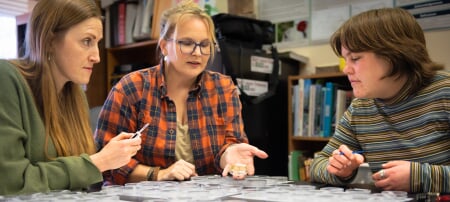Michigan Technological University’s Great Lakes Research Center (GLRC) has several events planned for World Water Day. This year’s theme is “Nature for Water.”
While World Water Day is traditionally celebrated on March 22, the Michigan Tech celebration is scheduled for March 27-29. The Michigan Tech observance features a keynote lecture, panel discussion on nature-based solutions for water along with film screenings and discussions.
A poster session and art exhibition is also part of the celebration. The poster session takes place March 27 and 28 on the waterside sixth floor atrium of the Dow Building. The art exhibit “Water is Another Matter,” opened March 15 and is on display through June 15 in the GLRC. The exhibit features the work of Jikiwe Ed Gray, Mary Brodbeck and Rachel Singel. Building hours are 6:30 a.m. to 8 p.m., Monday through Friday.
This year’s keynote lecture is “The Multidimensional Benefits to Sustainable Beach Reengineering,” by Greg Kleinheinz, professor of environmental engineering technology, Viessman Chair of Sustainable Technology at the University of Wisconsin-Oshkosh. The lecture will be held at 4 p.m. Tuesday, March 27 in Dow 641. A reception will follow.
The panel discussion “Nature-based Solutions for Water,” will take place 10 a.m. Wednesday, March 28, in GLRC 202. The panel of experts includes Kleinheinz, Ryan McCone, district supervisor in the Michigan Department of Environmental Quality's Water Resources Division, Brian Barkdoll, professor in Michigan Tech’s Department of Civil and Environmental Engineering and Erin Johnston, wildlife biologist with the Keweenaw Bay Indian Community.
"Water is the 21st Century Oil."
Liu, an associate professor in Michigan Tech’s School of Forest Resources and Environmental Sciences (SFRES), says events such as World Water Day are becoming more and more urgent: “We have to save water by any means, but nature-based solutions would be best to save water and protect the environment we live in.”
He says research conducted by the event’s keynote speaker is very important.
“Dr. Kleinheinz’s studies on recreational water and reengineering of beaches are based on vegetation buffers remediate contaminated (e.g. E. coli) sources of water (e.g. storm water, overland flow and sewers) and to clean up water before discharging to lakes," Liu says. "This solution also presents an opportunity for the local community to invest in the beach and stimulate the local economy.”
Tech’s World Water Day observance concludes with the film event “Specialized Films and Discussions on Nature-based Solutions for Water,” which will take place 4 p.m. Thursday, March 29 in GLRC 202. The films include “Ogichidaa, Local Legacy of Fishing, Preservation of Treaty Rights and Cultural Values.” A discussion of the film will be led by Jerry Jondreau, director of recruiting in SFRES and the grandson of commercial fisherman William “Boyzie” Jondreau, a central character of the film.
Other films include, “How Does Nature Conserve Water? Biomimicry Student Design Challenge,” “Storm Water Management,” “Floating Treatment Wetland” and “Treatment of Acid Mine Drainage.” Discussion of the films will be facilitated by graduate students Katie Closner and Jeffrey Kiiskila.
All events are free and open to the public. World Water Day at Michigan Tech is sponsored by the GLRC, Michigan Tech’s Department of Visual and Performing Arts and the Center for Environmental Outreach.
Michigan Technological University is an R1 public research university founded in 1885 in Houghton, and is home to nearly 7,500 students from more than 60 countries around the world. Consistently ranked among the best universities in the country for return on investment, Michigan's flagship technological university offers more than 185 undergraduate and graduate degree programs in science and technology, engineering, computing, forestry, business, health professions, humanities, mathematics, social sciences, and the arts. The rural campus is situated just miles from Lake Superior in Michigan's Upper Peninsula, offering year-round opportunities for outdoor adventure.






Comments